Peter MALONE
Saturday, 18 September 2021 19:25
Skin Deep/ 1989
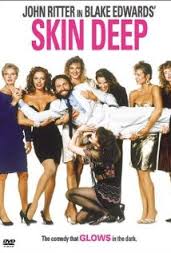
SKIN DEEP
US, 1989, 97 minutes, Colour.
John Ritter, Julianne Phillips, Vincent Gardenia, Don Gordon, Michael Kidd, Nina Foch.
Directed by Blake Edwards.
Skin Deep is a sex comedy written and directed by Blake Edwards. It is In the tradition of his 10 with Dudley Moore and The Man Who Loved Women with Burt Reynolds.
John Ritter plays a successful author with writer's block end a mid-life crisis., He drinks too much; he womanises too much. He goes to a psychiatrist, he talks things over with one of those wise barmen. However, he still loves his wife but is unable to commit himself to her.
As with Blake Edwards' other comedies, the humour is very broad and generally unsubtle. The film has several glowing condom sequences which gave it some notoriety at the end of the '80s. But also, as with Edwards, the film ends with its heart in the right place and reaffirms monogamous commitment.
John Ritter is amiable in the central role. There are a number of attractive actresses including Julianne Phillips. Michael Kidd appears as the psychiatrist and Nina Foch appears to advantage as the hero's mother-in-law.
1. Enjoyable and interesting, sex comedy of the '80s?
2. Blake Edwards and his more raucous American style, unsubtle and knockabout. Frank, with moral comment?
3. The title, ambiguities about sex, superficiality?
4. The film as a sex comedy, mid-life crisis comedy, the portrait of a womaniser, the blend of realism and farce, the '80s and permissiveness in visuals, language? The ultimate theme of commitment?
5. The California style; the glamorous author, the TV anchorwoman, the body-builder, the psychiatrist, the bar with the friendly barman, the range of women, lawyer, public functions, parties - the glossy style? Blake Edwards' picture - and yet mocking?
6. John Ritter's style as a comedian: his portrait of Zach, telling us what was happening? His background as author, skilled? The opening shooting and his involvement with the two women, with his wife? The build-up to their clash and separation? The sequences of his talking to his psychiatrist, the psychiatrist offering advice? The man at the bar, listening to his stories, offering advice? The growing desperation? Drinking, his accident, the irony of its being on his wife's television programme? The range of women to whom he was attracted, the visualising of the attraction? Loni and her size, musclebound, his going home with her, the next morning's aerobics? The relationship with Molly, the six months, his being demanding, the house burning down? His relationship with Alex, with Greg? The clashes with his stepson-in-law? The visit home, the encounter with his mother-in-law and her clashes, the dog? His going to jail, the driving, needing the advice of his lawyer? Getting him out? Going to the party dressed as Aladdin and everybody laughing at him? Going to Alex's house, the clash with Marge, his finding the address, turning up at Alex's wedding, spoiling everything, Marge's punching him? The return to the bar and the psychiatrist? The fable about changing nature, the story of the scorpion? The advice to the alcoholic - give up drink? His being at the beach, meditating, visiting his lawyer and the flood? His success? His talking frankly with Alex? The writing of the book, the fantasy (including Amy and party and his talking to all the people that he Knew, the rock'nroll boyfriend) and the illuminated condom sequence)? His resisting Becky? His success, declaration to Alex, with her again? Commitment?
7. The portrait of Alex, TV anchor, speaking the truth, the demands of the separation, her not wanting to speak to him again? Seeing him on the TV accident programme? Her son, the social, inviting Zach, her mother, the build-up to the wedding, the interruption of the wedding, Zach's success, their talking, the reconciliation, the final commitment, and the glowing condom not necessary?
8. Molly and the mix-up, the fight, the burning of the house, her return to the ruins, talking with Zach and telling him what was wrong? Loni and her picking him up, the sex, the bodybuilding, his joining the aerobics? Amy and her attractiveness, the rock'nroll boyfriend, the noise in the hotel, his complaints, the night with her, the two men with the condoms and the fight? Seeing Molly and Loni and Amy at the end?
9. The barman and his stories, his bar, friends with everyone, a good listener, good advice, knowing what was wrong all the time?
10. The psychiatrist, his therapy, his suggestions?
11. Marge and her dislike of Zach, her dog, wisecracks, the meal, the punch at the wedding? Greg and his dislike of Zach, Becky and her attractiveness? Greg and his abilities at playing the piano?
.12. The raucous comedy, especially the condom sequences and their notoriety, the homosexual couple, bickering, friendships, illness and suicides, funeral?
13. For what audience was the film made? Audiences identifying with the characters, their moral codes, personal crises, psychological needs, therapy, moral values, relationships? The blend of the flip and the serious? Commitment?
Published in Movie Reviews
Published in
Movie Reviews
Tagged under
Saturday, 18 September 2021 19:25
Sixteen Candles
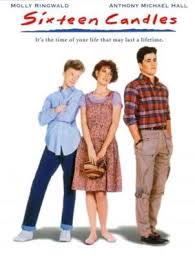
SIXTEEN CANDLES
US, 1984, 93 minutes, Colour.
Molly Ringwald, Anthony Michael Hall, Justin Henry, Michael Schoeffling, Gedde Watanabe, Blanche Baker, Paul Dooley, Carlin Glynn, John Cusack.
Directed by John Hughes.
Sixteen Candles was the first film directed by John Hughes and made a great impact with young audiences. A writer of some of the National Lampoon Vacations as well as Mr Mom, he went on in the mid-'80s to write a series of very popular films, directing several of them: The Breakfast Club, Weird Science, Pretty in Pink, Some Kind of Wonderful, Ferris Buhler's Day Off, She's Having a Baby.
He used Molly Ringwald in several of these films. She had made her debut in The Tempest and appeared in Space Hunter. With her particular pouty style, she was quite popular in the mid-'80s in such films as The Breakfast Club, Pretty in Pink, The Pick-up Artist, For Keeps. The film also uses Anthony Michael Hall who was to appear in The Breakfast Club and Weird Science.
The film focuses on Samantha and her family, their forgetting her 16th birthday and the repercussions at home, at school, with her eyes on the school jock and the help offered by 'The Geek'. Parents and grandparents are sketched in satirically, though Paul Dooley's father does have a final word of wisdom.
The film caters for the teenage audience - and may put off some older audiences. However, Hughes seems to have touched the pulse of the '80s generation and explored their world.
1. Youth-oriented film? Teenagers? Impact on boys, girls? on parents? The popularity of the film?
2. The work of John Hughes, his skill in writing comedy, his career with direction and writing and focus on teenagers?
3~ The atmosphere of the town, homes and school, the teen world, the teen perspective? The range of songs in the score?
4. The structure of the film: family and characters, Samantha's birthday, school and types? Relationships, growing up? Birthday and wedding?
5. Molly Ringwald as Samantha: the beginning of the day, the house, her expectations, the ordinariness of the detail, her parents and their reaction, her brother? tier disappointment? The details of school, admiration for Jake but his distance, watching the girls in the shower, the exercises, classes? Hopes? Her friendship with The Geek and his intervention? At home, the grandparents and her grandfather's brash comment about her growing up? Leaving the meal, going to the dance? her shyness with Jake? Her parents, her brother? Her listening to The Geek's stories and her disgust? The build-up to the wedding, her participation? her talking with her father, his advice? Audiences invited to share the 16-year-old girl's world?
6. The sketch of the family: the parents and their being busy, preparing for the wedding, not listening, wanting to help? The younger brother and his slinging off? The sister, the wedding, the build-up, in-laws, her tears? Nervousness? Her behaviour during the ceremony? Afterwards? The comic detail of life in the home?
7. The two groups of grandparents, the visit, their talk, different styles? The relationship? Their bringing the Vietnamese student? The repercussions?
8. Jake and the boys in school, the party and his girlfriend's brashness, the attraction towards Sam, the intervention of The Geek, his shyness? Her shyness? The meeting, relating?
9. The Geek and the satire on the brash teenager, trying to be cool, being geeky? Comic talk ? Telling stories, grossness? Friendship with Jake, helping him out, the encounter with the girlfriend, the car, the talk about sex?
10. Jake's girlfriend, the prom queen, the party, trashing the house, zonked out? The night with The Geek?
11. The birthday and its comedy, the meals, school? The wedding farce?
12. Long Duc Dong and his visit, with the grandparents, school, the big girl and the exercise gear, drinking and drunk?
13. Teenagers identifying with this world, with the characters, awkwardness, sympathy - and unresolved questions?
Published in Movie Reviews
Published in
Movie Reviews
Tagged under
Saturday, 18 September 2021 19:25
Sins of Rachel Cade, The
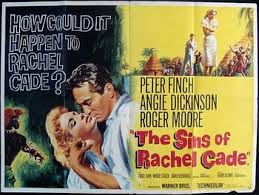
THE SINS OF RACHEL CADE
US, 1960, 123 minutes, Colour.
Angie Dickinson, Roger Moore, Peter Finch, Errol John, Woody Strode, Juano Hernandez, Frederick O'Neal, Mary Wickes.
Directed by Gordon Douglas.
The Sins of Rachel Cade reminded audiences in the early '60s of The Nun's Story, released in 1959. Probably Rachel Cade will still remind audiences of The Nun's Story. .
The film portrays a young American missionary who is a nurse in the Belgian Congo before World War Two. She works with the villagers to help them and clashes of course with their witch doctors and their influence. She has a romance with a -flyer, played by Roger Moore. She has a friend in Derode, the Belgian Commissioner, played by Peter Finch (once more reminding audiences of The Nun's Story). There is a strong supporting cast of black actors including Errol John, Woody Strode, Scatman Crothers, Frederick O'Neal, Rafer Johnson.
The film is colourful, romantic, earnest - and has a lush Max Steiner score. Direction is by Gordon Douglas, director generally of westerns and action dramas.
1. An entertaining romantic melodrama?
2. Location photography, the atmosphere of Africa? The 1930s? The musical score?
3. The title and its focus on Rachel? Her moral stances as a missionary? her relationship with Wilton? The consequences? Audiences bringing moral judgment to story and characters?
4. Angie Dickinson as Rachel Cade? Credible as a missionary? As a nurse? The impact of her arrival? her predecessor and the run-down condition of the village? Her establishing herself? The assistance she received? The reaction of the villagers? Clashes with the High Priest and witch doctor? The encounter with Paul Wilton, the crash, the rescue, nursing him, falling in love, the affair? The effect on Rachel and her conscience? The reaction of the people in the village? Her pregnancy? The encounters with Derode? His comments on her being there, suitability of her work? His respect for her, falling in love with her? His stern manner? Derode telling Paul to come? His return and offering to take her to America? Rachel’s reaction to him, to his sense of duty? Her decision to stay with her child in the village? The support of Derode?
5. Peter Finch as the Belgian Commissioner, his response to Rachel's arrival? Urging her to leave? His visitations? The clashes with the witchdoctor? His reaction to her affair with Paul? His decision to tell Paul the news? Paul's return? Derode's standing by Rachel?
6. Roger Moore's style as Paul Wilton, the RAF, the plane crash, the rescue, Rachel nursing him, his response to her, convalescence, falling in love, the affair? His leaving? Not knowing she was pregnant? His return, his proposal, her turning him down?
7. The portrayal of the villagers: their needs, Christianity, physical and medical needs? Their village chiefs? The attitudes towards the missionaries? The High Priest and witch doctor? Local customs and religions? The clash with Rachel, blaming her?
8. The religious themes: the missionary and her integrity, moral stances? The encounter with Paul, the affair? Her pregnancy? Her decision to stay in the village with her baby?
9. The popular ingredients of romance, betrayal, moral responsibility, guilt?
Published in Movie Reviews
Published in
Movie Reviews
Tagged under
Saturday, 18 September 2021 19:25
Simon
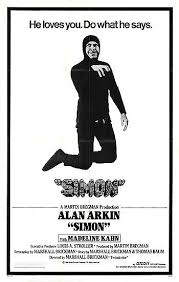
SIMON
US, 1980, 97 minutes, Colour.
Alan Arkin, Madeline Kahn, Austin Pendleton, Wallace Shawn.
Directed by Marshall Brickman.
Simon is a satire on scientific advancement and the pomposity of scientists. It focuses on a think-tank who take science and morality unto themselves in a mischievous way. They are satirised heavily - with Austin Pendleton as the chief target. The contrast is with a would-be boffin played by Alan Arkin, who is caught up in the plans of the think-tank and made to believe that he is an extraterrestrial. The film has repercussions for Simon and his having to come to his senses, for the status and stances of the think-tank and for the audience's belief in science.
Alan Arkin is effective as Simon, Austin Pendleton very good as the leader of the think-tank. There is support from Madeleine Kahn pretending to be top scientist. Writing and direction is by Marshall Brickman, co-author of several films with Woody Allen, including Annie Hall and Manhattan.
1. An effective satire? Comedy? Visual and verbal wit?
2. A film of the '80s? The background of science? Science fiction and imagination? The atmosphere of the think-tank and the laboratories? The vast financial and plant resources given to scientists?
3. The media technique of introducing each of the members of the think-tank? Carl Becker and his leadership, Leon with media and total environment control, Dr. Burmund, the pharmaceutical and genetic experts? Their comments, their origins, the money made available to them, their work?
4. The film's presentation of science and scientific and technological advancement, the whims of the group, their madness, their childish behaviour, their control of plans? Money? The idea about the extra-terrestrial? Their executing the plan? The irony of their childish but expensive plans, like that of changing the television ratings?
5. The introduction to Simon, his work and hopes, the tank, his submerging himself (even for short times)? A satirical character? Relationship with Lisa? His assistant? His being contacted by the think-tank, his being flattered and going, the dinner and the intellectual talk, his believing them? The introduction to Cynthia and her wide expertise? Working with
her? Immersing himself in the tank? The experience of being immersed and its effect on his psyche? The group feeding him the information and brainwashing him that he was an extra-terrestrial? His reaction, believing it, his comments on human life and Earth? His health? The media taking over? Lisa's trying to persuade him of the truth? The challenge, his being sent into space, his shrewdness in tricking Carl into the rocket? The years passing, the quietness of the happy ending, with Lisa and the baby? The message of Simon's experience?
6. Becker and his control of the group, the talks without the media, the tantrums of each of the group? Their comeuppance?
7. Madeleine Kahn's humorous presentation of Cynthia and her absolute expertise, working with Simon - an actress? the media, its interest in the scientists, reverence for them?
8. The presentation of them, the media response to Simon, spreading his message?
9. An effective satire, American themes, universal themes, scientists and their status, wanting to play God? The contract of normality?
Published in Movie Reviews
Published in
Movie Reviews
Tagged under
Saturday, 18 September 2021 19:25
Silver River
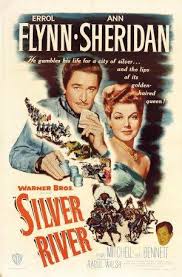 SILVER RIVER
SILVER RIVERUS, 1948, 114 minutes, Black and white.
Errol Flynn, Ann Sheridan, Thomas Mitchell, Bruce Bennett.
Directed by Raoul Walsh.
Silver River is an Erro1 Flynn western. It is set after the Civil War and moves through the decades as the participants in the war settle down, become involved in big business and politics. Flynn has an unsympathetic role. Ann Sheridan is a strong heroine and Thomas Mitchell has a good opportunity as a philosophising lawyer who goes into politics.
The film was directed by Raoul Walsh who had directed Flynn in many action adventures, westerns and World War Two epics. The film has a score by Max Steiner and the screenplay was co-written by Harriet Frank Jnr. (who was to write many screenplays with Irving Ravetch for Martin Ritt). The film is the material that would have been used for mini-series in later decades.
1. An interesting and entertaining western? Post-Civil? War epic? Finance and politics in the 19th. century?
2. Production values: black and white photography, stars, western locations? Max Steiner’ score?
3. The title and the focus on Silver River and Silver City? The city built up after the Civil War? Pioneers, outlaws, big business, politics?
4. The film's focus on men like Mc Comb: the Errol Flynn style - but an unsympathetic role? The Civil War and McComb's involvement? The payroll? His taking the money, burning it? Arrested, put out of the army? His reaction against his treatment and his wanting his own rules? Gambling? His using the army uniform to attack the gambling hall? His becoming a professional gambler? His holding the gun on his rival, crossing the state line? The encounter with Georgia Moore on the boat? her collecting money? His winning her money gambling? His abandoning her? His arrival in Silver City? His taking Georgia with him? The clashes with Sweeney? Sweeney being stranded? The encounter with Georgia Moore - attraction? Her husband? The encounter with John Plato Beck? The alcoholic lawyer? His prodding Mc Comb's conscience? The business deal with Stanley Moore? Georgia's suspicions? The failure of the mine, Mc Comb and his financial aid? The continued attacks by Sweeney? The setting up of the bank?? The visit by president Grant to encourage silver production? Mc Comb and his ambitions? His wanting Georgia? The parallels with David and Bathsheba pointed out by Beck with his taking Georgia and allowing Stanley's death? His trying to rescue him too late? The clash with Beck? Beck's influence on people in the town? Georgia uncertain but on side with Mc Comb, Beck and his rivalry, the businessmen, the bank, politics Mc Comb ostracised from the town, getting revenge, the closing of the mines? The alienation from Georgia? The run on the bank? Paying out? His anger that Georgia is working for Beck? Sweeney killing Beck? Mc Comb and his reconsideration of his life, his past? Georgia helping the people to support him? His use of - the troops in a military action, the attack-on Sweeney and his men? The restoration of law and order to Silver City? The emerging tough hero?
5. Georgia and her relationship with Stanley? Support of him? Her patriotism? The boat and the collection of money? The wagons? McComb? winning them and abandoning her? His decision to take her and her puzzle about him? Her work with Stanley, his running the mine, the greater power of Mc Comb? His wanting her and her reaction against him? Her husband's death? Her belief in McComb? Her disillusionment, working for Beck? Her final support of him? The changing relationship with Mc Comb?
6. John Plato Beck - Thomas Mitchell's alcoholic lawyer? His position in Silver City? His sayings? Friendship with McComb?, advice? Conscience? His reaction against Mc Comb's ruthlessness? His attack on McComb? for the death of Stanley and his taking Georgia? The David and Bathsheba parallel? Beck and his rousing up feeling against Mc Comb? Organisation of local businessmen? Beck and politics? His murder by Sweeney?
7. Sweeney and his continued rivalry with Mc Comb, the outmanoeuvring of each other? Sweeney and the hold in Silver City? Money, banks? The death of Beck? Final attack on him?
8. Stanley and his devotion to his wife? Belief in her? belief in Mc Comb? The mine? The failure of the mine? McComb's abandoning Stanley? His death?
9. The range of people in the background: the Civil War and the soldiers, the gambling saloons, the riverboats, the miners, the businessmen in the town, politicians, the outlaws?
10. Themes of the American West? The establishing of order and politics after the Civil War? A piece of Americana?
Published in Movie Reviews
Published in
Movie Reviews
Tagged under
Saturday, 18 September 2021 19:25
Silver City

SILVER CITY
US, 1951, 90 minutes, Colour.
Yvonne de Carlo, Edmond O'Brien, Barry Fitzgerald, Richard Arlen, Gladys George, Edgar Buchanan, John Dierkes.
Directed by Byron Haskin.
Silver City is an enjoyable, average but well-made western supporting feature of the early '50s. Edmond O'Brien is not exactly a romantic lead. Yvonne de Carlo is an enterprising miner's daughter rather than a glamorous heroine and Barry Fitzgerald, sporting some stubble, is the villain.
The film is set in the West, concerns the mining of silver, has the usual gallery of characters and confrontations from the West and has the climax with an elaborate chase.
Of its time, but with its straightforward narrative and characters, it is still quite entertaining.
1. Enjoyable western? Gallery of characters? Confrontations?
2. Colour photography, locations, the atmosphere of the period? The final chase?
3. The title and tie focus, mining, violence, greed? The frontier?
4. Edmond O'Brien as Carkin Moffatt: the clash with Charles, the hold-up, his complicity, betrayal, the chase, the train and the dive? His being ousted from the various jobs? Assaying silver in the city? The meeting with Candice and his interest in her? His honesty? Refusal to be the foreman? Jarbot and his pressure on the family? The arrival of Charles and Josephine? His decision to take the job? The confrontations in the town, devices for getting the men to work, starting the brawls? Clashes with Bill? Josephine and her attraction towards him? With Charles? Suspicions of the hired killer, his being hired to kill Moffatt? The confrontation? The pursuit of the killer in the sawmill? The happy ending?
5. Candice and her enterprise, with her father, his support, the question of the mine and its lease, getting Moffatt's support, the clashes with Josephine, her concern about the shooting, the sabotage at the wine, the happy ending?
6. Jarbot and his owning the lease, his greed, his henchmen, buying off the men, his use of Bill, the possibility of killing Moffatt, his not giving his consent, Bill and the confrontation, shooting hip? Bill as the young gunman, violence in the town, plans, setting up Charles against his wife, the plan to shoot Moffatt, his killing of Jarbot?
7. Charles and his honesty, love for Josephine, the marriage and its brittleness, his boycotting Moffatt, his influence, arrival in the town, with Jarbot, his suspicions of Josephine, clashes with Toffatt, the irony of his being killed?
9. The characters in the town: the men of the mill, the hotel and Gladys George as the manager?
10. American frontier, greed, law and order, violence? The frontier and its heritage?
Published in Movie Reviews
Published in
Movie Reviews
Tagged under
Saturday, 18 September 2021 19:25
Silent Voice/ Amazing Chuck and Grace
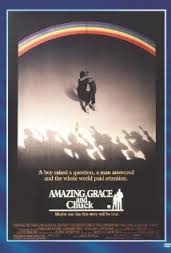
AMAZING CHUCK AND GRACE (SILENT VOICE)
US, 1987, 114 minutes, Colour.
Jamie Lee Curtis, Lee Richardson, William Peterson, Gregory Peck.
Directed by Mike Newell.
Silent Voice (Amazing Grace and Chuck) is a fable about a young boy - but a fable with a strong universal anti-nuclear message. Chuck is a twelve-year-old who decides to stop playing baseball after visiting a nuclear silo. He is joined by a number of sportsmen and women and the protest spreads throughout the world. Gregory Peck plays the American President who has to deal with the boy and his protest as well as negotiations with the Soviets.
The film is handled well, directed by English director Mike Newell (Bad Blood, Dance With A Stranger, The Good Father). While the plot is, unfortunately, impossible, it is nevertheless put forward with emotion and conviction.
1. A successful anti-nuclear fable? A piece of Americana? Its impact as humian-drama? Social message?
2. America in the '80s, and beyond? The stance of the film, its credibility? Protest and its effect? Political repercussions, military, social? Business interests? The repercussions for sport?
3. The setting in Livingston, Montana, the Rockies settings? The contrast of the small American town with Boston? The Elmer Bernstein score?
4. The different titles and their emphases? American style? Overseas style?
5. The work of the director, his interest in human interaction, his interest in crime, justice and the law? The strong cast? The national impact? International?
6. The portrait of Chuck: in his family, mother and father, sister, his age, his skill at baseball? His own rocket, the monkey? The irony of the children being taken to the silo by the enthusiastic politician? His boasting and explanations? Chuck's concern? The importance of his dreams - and nuclear destruction? His decision to bow out of baseball? The reporters and interviews? The effect on Amazing and his coming, the bond between the two? Friendship? Their stance and protest? Courage of conviction? Chuck's parents and their concern, the reactions of the people in the town, the violence? The attacks on his mother, his sister? Mad Dog and the friends coming to see Amazing? Their laughing, taunting, deciding to stay? The setting up of the commune? The joyful atmosphere? The media coverage? Chuck and his father, his father's calmness and anger? Taking him fishing? Talking? The intervention of the President; Chuck and his visit, the negotiations with the Russians? The plea of the President and his refusal? With Lynn and the friendship with Amazing? The repercussions of Amazing's death? His speech to the media? His silence and the sign? At school, the angry teacher, the children joining the protest, it becoming world-wide? The second plea by the President? Chuck meeting the President, calm, decision? The talk with Lynn about Amazing and the protest? Friendship? His dead family? The President and the negotiations, the change? His coming to see Chuck? The ending, the baseball game, the silent protest? A young boy of character, achievement?
7. Amazing Grace and his skill at sport, in himself, his experiences and his family, his response to Chuck, friendship, fatherly? The decision to give up sport? Persuading his friends? Sharing life in Montana? Handling the media? The friends and their response to the violence? His friendship with Lynn, her warnings? Going to Boston and seeing Mr Jeffries in the spa, the threats? His phone call to Lynn, the plane's explosion? His strong presence in their memories? His giving his life for the cause? His friends, their humour, going to visit the silo, deciding to give up their sport, join the protest? The range of sports figures joining?
8. Lynn and her management, friendship with Amazing, the contemplation of the river, the visits of Mr Jeffries, his friendship, sinister aspects, his final warning? Her phone call, her knowing that Amazing would die, her grief? Her talk with Chuck and explanation of the friendship? Her support at the final match?
9. Chuck's parents, his father and flying, ordinary scenes at home, his sister? The rocket and the mouse? Their reaction to their son's protest, finding it hard, his father's anger, yet support, not forbidding him? Russell's military friend, his boasting about the rocket capacity? The details of his tour of the site? Russell and his son's refusal? The news of Amazing's death, communicating it to his son? The encounter with the President? His final support of his son? The family at the final match?
10. The President and his handling of the situation, negotiations with the Russians, advice from his aides, talking with Chuck, negotiations with the Soviet Premier, the secret visits? Discussions? His reaction about Jeffries and Amazing's death? The phone call and the strict orders to Jeffries? The ending and his support of Chuck? His sign at the match?
11. Jeffries and big business, sinister presence, his intimidation of Lynn, his warnings, Amazing's visit to the spa, his death? The business associates, the blimp flying over the Boston skies with the news? The President's phone call and threats? The comment on money and big business interests in armaments?
12. The media and their presentation of the case, the world of sport and its being held up by the protest, school?
13. Emotional identification with characters, issues, circumstances?
14. Themes of peace, nuclear war, the reality of the silos (death in the ground)? Human resilience and hope?
Published in Movie Reviews
Published in
Movie Reviews
Tagged under
Saturday, 18 September 2021 19:25
Silence of the North
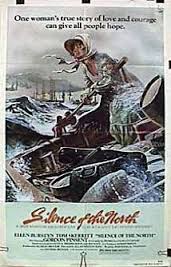
SILENCE OF THE NORTH
Canada, 1984, 94 minutes, Colour.
Ellen Burstyn, Tom Skerrit, Gordon Pinsent.
Directed by Allan King.
Silence of the North is an attractive Canadian film based an a true story of the heroine. Information given at the end of the film states that in 1980, Olive was still alive, surrounded by her family in north-nest Canada.
The film uses Canadian locations beautifully. Ellen Burstyn is a strong personality and carries the character of Olive with conviction. Tom Skerritt appears as her husband. Canadian actor Gordon Pinsent is her would-be suitor.
The film is quite restrained in its presentation of characters and their difficulties in the '20s and '30s, tie atmosphere of the Depression, the hazards of living in the wild North.
There is an attractive musical score and a theme song by Neil Young, 'Comes a Time'. The film had little theatrical release outside America.
1. An interesting and entertaining film? Human portrait? The times? People struggling with nature?
2. The location photography, the atmosphere of the Canadian wild north? The scenes of the towns, the frontier, the wilds add the forest? The editing and pace for action sequences? The musical score? The title song?
3. The title and Olive's speaking of the silence and what she remembered of the north? The focus on the North and its remoteness, majesty, primitiveness, daunting of human beings? Its majesty and silence?
4. The portrait of Olive: her autobiography, seeing her as a young girl in 1919, her hopes and ambitions, her life in the town, the fair and the selling of her basket and Walter's high bid against Arthur? Arthur and his devotion? Her marrying Walter and going north? Their journeys, hardships, their early home and the primitive life? Her enduring the hardships but yearning for something core settled? The trappers? The incident with the madman coming in with the gun and taking their provisions? Her pregnancy and the birth of her daughters? The hardships, the bears? her desperation? The house burning down? Going back into the town, asking Walter to settle down? The encounter with John Frederickson with her daughters and his keeping her alive? His having to bring the news of Walter's death? The irony of her being pregnant and the birth of her boy? Pith the children out in the wilds, starving, their not wanting to shoot the moose, her shooting the buck and its being needed for their food? The attack of the wolves? Her relationship with her children? The decision to move to Calgary? Getting work in the soup kitchen? Encountering John, Arthur and his coming back to offer his support? The dances with John, her jealousy of the schoolteacher? Her care for her children, the little boy and his spinal meningitis and her refusal to face his death? John's absence? Meeting him again? His going north with the air service? Her finally saying yes to him? The joy of going north with the children? The use of the voice-over commentary?
5. Walter and his being in the north, his love for Olive, bidding for her basket? Their marriage, going north, his work as a trapper? Absences from the home? Love for Olive? The children? The hardships, the burnt house? His going off as a trapper, the news of his death? His absence in Olive's life?
6. The children, the difficulties of their birth, growing up in the north? The little boy? shared experiences, their starving, not wanting to kill the moose? Going to Calgary? The boy's illness? The girls and theist support of their mother, love for John?
7. John Frederickson and his working in the North, minding Olive and the children, saving them? Encountering them on and off over the years? His having to bring the news of Walter's death? The chance encounter in the soup kitchen? The dance, his love for Olive, the schoolteacher, Olive saying yes and their going north with the air service?
S. The atmosphere of the Canadian towns, their spirit in the '20s? The fairs? The outposts and the mining towns? The remoteness of the forests and the lakes? The wild animals, bears and wolves? The terror for human beings? Fire? Isolation? The contrast with Calgary during the Depression?
9. The themes of men and woman facing the frontier, marriage and its difficulties, family, provision and survival, the strong mother with her children, protecting them?
10. A humane and warm film? Its insight into human nature?
Published in Movie Reviews
Published in
Movie Reviews
Tagged under
Saturday, 18 September 2021 19:25
Silence of the Heart
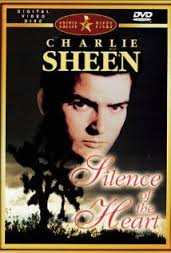
SILENCE OF THE HEART
US, 1984, 100 minutes, Colour.
Chad Lowe, Mariette Hartley, Howard Hesseman, Dana Hill, Charlie Sheen, Elizabeth Berridge, Sherilyn Fenn.
Directed by Richard Michaels.
Silence of the Heart is one of those American telemovies that deal very well and seriously with a social problem and its consequent questions. The focus in this film is teenage suicide.
The film focuses on a presentable young man in his final year at high school who does not get the desired exam results, cannot evoke from a girlfriend his desired response, feels neglected by his parents and unable to live up to their expectations. As portrayed by Chad Lowe, he is quite credible and his suicide a shock. The parents are very well played by Mariette Hartley and Howard Hesse. Dana Hill is the sister who is puzzled and worried by her brother's death. Charlie Sheen portrays a friend.
Audiences can identify with the characters and their way of life in this film, are invited to look at the situation from the point of view of the victim as well as the point of view of those concerned. The drama is strong and builds up to a questioning of responsibility and a plea from Mariette Hartley as the mother for communication and sensitivity.
1. The impact of the file? Its drama? Social problem? Relevance? ultimate effect?
2. The skill of the American telemovie in communicating to American audiences, universal audiences? Characters and style for audience identification? Probing of the problem?
3. The American town, homes, school? The range of people, ordinariness? Audiences able to identify with characters and experiences?
4. The title of the film: from poems by Sylvia Plath (with the background of her own depression and suicide)? Skip and his comment of dying as an art? The build-up to his suicide? His use of Sylvia Plath's poems as a means of communication? Last message? Themes?
5. The portrait of Skip/Michael? His age, in himself, potential? Appearance and skills, working out physically? His disappointing exam results? His infatuation with Andrea and her friendship and his wanting Pare? Working in the pizza shop? Talking with Penny? The bond with Ken and their sharing? Going home, his mother and the exam results and her seeming in difference? Cynthia on the phone? Dad and the barbecue and his lame telling of the duck joke? His not going to the barbecue, the visit to Andrea and her trying to speak to him realistically? The talk with Penny? The party, the stripping, going for the swim? His depression? Talking with men about suicide and means? His decision, looking at the cliff, sitting in the car? The audience understanding what was happening to him?
6. The effect of his death, the kids all knowing, their talk, Andrea, the basketball player and his talking to Ken, Penny? The parents and Cynthia not really knowing? Hearing? Ken and his antagonism? , The mother and her going to talk with Penny? The importance of Cynthia's video speech to the class?
7. The funeral, grief, the aftermath?
8. The portrait of the parents: the mother and her love but offhand behaviour, her wanting to farewell her son, the stoic reaction of her husband, meals at home, believing that it was an accident? Cynthia's place in the family and her tension? The mother and her decision to discuss with Penny, finding out the truth? The husband and his discussion with Ken, Ken not able to tell him the truth? Their clash about Ken? Tension at home, Cynthia's speech, the video, the visit to the counsellor and discovering the truth? The visit to Ken's mother and the warning about the same thing happening with Ken? The father not admitting the truth, wanting to be buddies with Ken, seeing himself as a buddy of his son? His remembering of his father? The decision to build the house, Ken's help? The video and his being against going to the school counsellor? Ken's letter and the poems on the bicycle?
9. Andrea as an ordinary young girl at school, friends, the relationship with Skip, her speaking realistically to him? His leaving the Sylvia Plath poems with her? Her blaming herself?
10. Penny and her love for Michael, sharing, but it not being reciprocated? Talking to him on the night of his death? Speaking frankly to his mother?
11. Ken and his friendship, their sharing? ten as a character, his hospital visitation, reading to the boy? The boy's death and his feeling it? His own good results, skill at sport? His relationship with his parents, criticising them? His inability to talk to his mother, her bland reassuring him and telling him to have no guilt? The video speech, talking with Cynthia? Taking the poems? Leaving them with the bike? His going to the cliff, the possibility of his killing himself? Blaming himself?
12. The credibility of the ending? Ken's behaviour? Michael's parents and their talking to him, trying to persuade him, the role-play and his saying that he would have told Skip 'You'll get over it'?
13. Themes of guilt, responsibility? Sensitivity to messages, affirmation of love?
14. The finale of the mother's appeal for understanding and sensitivity?
15. An effective telemovie? Audiences sharing the experience? Probing of a social question?
Published in Movie Reviews
Published in
Movie Reviews
Tagged under
Saturday, 18 September 2021 19:25
Sessions

SESSIONS
US, 1983, 96 minutes, Colour.
Veronica Hammel, Jeffrey de Munn, Lenny Van Dohlen, Tracy Pollan, David Marshall Grant, George Coe.
Directed by Richard Pearce.
Sessions is an offbeat telemovie, the psychological study of a callgirl. The framework of the film is therapy sessions between the callgirl and a psychiatrist. The film visualises her life, her relationship with family, with boyfriend, with a potential husband, with her clients.
The film offers plausible insight into the character and her motivations. She is played with cool intensity by Veronica Hammel (Hill St. Blues). The film is set in chic New York, captures the atmosphere of the city, gives a view of the callgirl's clients - and their eccentricities, dependence, pitiable needs. Direction is by Richard Pearce who made the excellent features about farm life, Heartland and Country.
1. The impact of this telemovie? Themes, character, situations, issues?
2. The chic New York world: affluence, apartments? The world of the callgirl? The world of psychiatric therapy? The moods, style, musical score?
3. The title and the structure of the film: the view of Lee's character within the context of her reflections for the psychiatrist? Her therapy? The culmination of the therapy in her change of lifestyle?
4. The film reflecting on Lee's process of therapy: the ups and downs, her history, explanations, the influence of her father and her resentment, her relationships with people, her attitude towards men and using them, her desire to control and win, never to weep? The processes of change through the therapy?
5. Veronica Hamel as Lee? Her stature and beauty, presence? In herself, her severity? Her relationship with her daughters? Sending them to school? The pleasing scenes of mother and daughters? Her sister and her visit to New York? Her advice to her sister? The meeting with her mother and father? Her memories of her father and his dominance, cruelty, winning psychological battles, her capitulating by weeping? Her decision never to weep? Her resentment of her father's attitude towards her sister's birth, 'another one'? His poor view of women and their being exploited? Her relationship with Josh, his being out of town, inviting him over, his staying? her using him? Her range of friends? Especially amongst the callgirls? Her respectable friends and dining out? The arrangement to meet Walter, the dinner, finding him charming, the puzzle about responding to his invitation to the ballet?
The affair with him and its effect on her? The contrast with her clients, the games that she played, her aloof attitudes get playing the games? her collapse, drinking? her decision to change?
6. Lee and the world of the callgirls, her different name, Randy? Her manner of speaking, dressing, make-up? The clients and their games? Her pandering to them and flattering them? The professor with the dog-leash etc.? Max and his abusing her confidence? The appointments, her being adaptable? Money? The credibility of Lee as a callgirl?
7. Josh and his friendship, sharing confidences, support? her breaking with him and ordering him out? her returning to him and being disappointed when he was with another woman?
8. Walter and his suave manner, the meal, the outing to the ballet, the encounter with Max and his wife? Relating to her, wanting her to move in, her fear of this? The breaking of the relationship?
9. The clients and their visits, Max and the ballet and his later visit? The range of businessmen coming to town?
10. Lee's callgirl friend, her clients, her hopes, the young man and his physically bashing her? Her friendship with the actor - continued hopes of love?
11. The sketch of her sister, the visit to New York, outings? Her parents and her memories of childhood?
12. Themes of city society, relationships, sex, power? The effect of therapy - and Lee's getting her daughters and moving to a new life in California?
Published in Movie Reviews
Published in
Movie Reviews
Tagged under